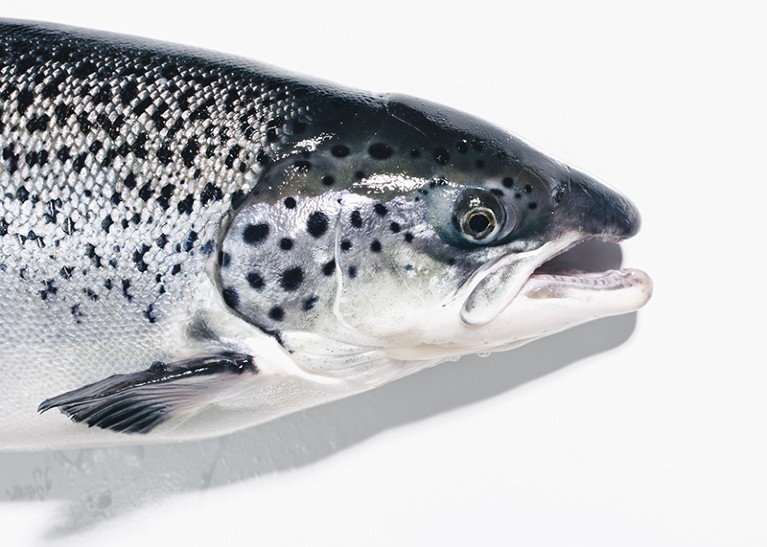Hello Nature readers, would you like to get this Briefing in your inbox free every day? Sign up here.

The firm that developed this transgenic salmon has tried for years to bring it to market in the United States.Credit: AquaBounty Technologies
Animal gene editors look beyond the US
Tired of regulatory confusion and a lack of funding, some US researchers are taking their gene-edited livestock abroad. One company’s experience is a cautionary tale: its fast-growing salmon is the only genetically engineered animal ever approved for consumption by the US Food and Drug Administration, but labelling requirements have kept the fish off the shelves. The company will market its next creation — a fast-growing tilapia — in Argentina.
Satellite spies signs of slavery from space
Researchers are harnessing the burgeoning number of Earth-observing satellites to detect modern slavery from space. Citizen scientists and machine learning can help to identify the distinctive scars of sites likely to be using forced labour, such as illegal mines or transient fish-processing camps. But local knowledge is essential to know what you’re looking for — and then the knowledge has to be converted into action on the ground.
Largest known bee spotted after 38 years
Conservation biologists have rediscovered the world’s largest known bee, which scientists hadn’t seen since 1981. The single female Wallace’s giant bee (Megachile pluto) was found inside a termites’ nest nestled in a tree in Indonesia. The bees can grow to almost 4 centimetres long, around the size of a golf ball. “To hear the sound of its giant wings thrumming as it flew past my head was just incredible,” says conservation photographer Clay Bolt.
FEATURES & OPINION
Six women describe how they beat the odds
Nature spoke to six women from disadvantaged backgrounds about the challenges that they faced on their science career paths. “People from disadvantaged backgrounds can be so grateful for what they get that they don’t know how to ask for anything more,” says biomedical engineer Liz Wayne. “I didn’t understand that I could argue for extra points on a test. I didn’t realize that I could ask for help.” Chemical ecologist Cassie Sims notes that there are also advantages to be gained from having a different perspective: “When equipment breaks, I try to fix it before calling a repair person. That’s the mindset of someone who has grown up poorer.”
Dams can reduce natural greenhouse gases
Dams sometimes get a bad rap for their environmental impact. At the same time, methane emitted by wetlands gets a pass, because it’s naturally occurring and hard to measure. We need pragmatic solutions in a rapidly warming world, argues water-management policy adviser Mike Muller. Hydropower dams can manage methane emissions and produce clean, cheap energy at the same time.
The answer to life, the Universe and everything
From Newton’s forces to Einstein’s space-time, the material Universe can be modelled by a variety of useful laws that give us equivalent predictions at the same scale. But go deeper, and some of those descriptions of reality fall away, whereas others expand to embrace phenomena at other scales. The real ‘theory of everything’ might be “the question to which the universe is the answer, and the nature of that question in and of itself explains why it was possible to describe it in so many different ways,” says physicist Nima Arkani-Hamed.
